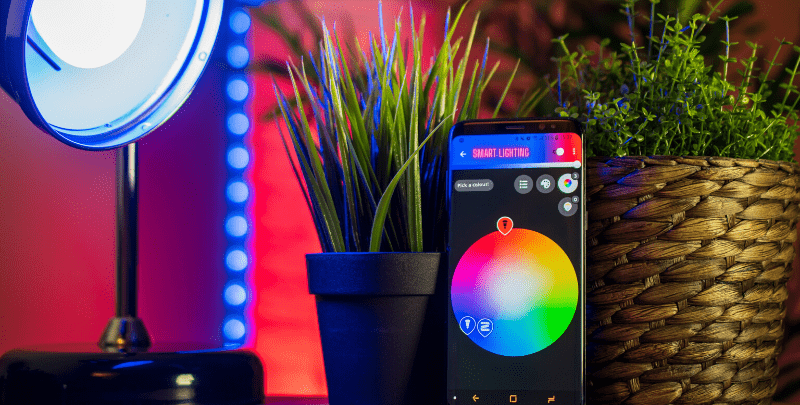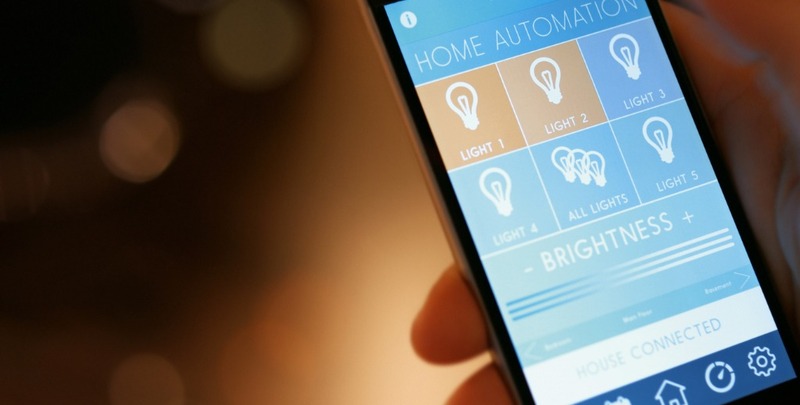All You Need to Know About Smart Lighting

Smart lights are the perfect way to try out a smart home without forking out the big bucks. You will be able to find out if home automation is for you without taking a heavy hit to the pocket.
Wireless LED bulbs are a great start. They can be controlled via an app on your phone and through a voice command assistant like Amazon Alexa, Apple Homekit and Google home assistant.
You can set them to turn off and on using a timer, set a particular mood, and even choose from over 1000 different colours. Yes, that’s right! You can change the colour of the light whenever you want.
All of these cool features are made possible by your wifi network. And don’t worry, the setup process is quick and easy. The lights connect to your wifi network with the click of a button.
Why smart lighting?
Most smart lights use LED technology that lasts up to 20 times longer than your average light bulb! Of course, you also have the ability to control them from the comfort of your armchair. You may think of this as the height of laziness, but it’s actually super convenient.
Smart lighting apps often allow you to control your lights in groups. So if you want some dimmed or some a different colour to the others, all you have to do is log on to the app. You can even set them to change colour based on the time of the day.
Let’s recap some of smart lighting’s biggest benefits:
- Couch control
- App and voice control
- Colour changing
- Remote access
- Long-lasting
- The ability to use as an alarm
What kind of smart lights are available?
Smart lighting comes in a standard bulb, candle bulb and a spotlight. You can get them in a bayonet fitting, screw or a clip downlight fitting. A typical bulb is 9.5W or 5.5W, which is great when you consider that a typical light bulb is normally around 60W or 50W.
Pretty much all of your favourite electrical brands offer a smart lighting range. So the choice is really up to you! If you’re an Apple fan, they tend to push the Phillips range heavily. Even IKEA have their own range of smart lights!
How much is smart lighting?
You can pick up a smart light for as little as $15, however, you are better off spending the money to get a quality product. Of course, smart lighting costs more than your conventional light bulb but because they use less energy, you will save money over time. The investment is definitely worth it, especially when you incorporate them into a smart home system.
You’ll usually have a choice between a white smart light or a colour changing one. You will pay a bit more for the colour changing one, but you should reap the rewards on your electricity bill over time.
There is a lot of evidence to suggest that smart lights are here to stay, so there is no need to be worried about them becoming obsolete. They are expensive to get kitted out, but who’s to say you won’t end up paying the kit off with the money you save on your bill?

Can you use different smart lighting brands together?
It can be done but you are generally best to pick one brand and stick to it. This allows everything in your home to be streamlined and you don’t have to worry about incorporating different apps into your everyday life for different sections of your house.
Some manufacturers allow you to use your lights via a system like Google Home, whilst others make you access the lights via their own app. If you are going to get two different brands of smart lighting, make sure they both have the ability to connect to the one smart assistant. That way, you eliminate the need to download multiple apps and everything can be accessed in one place.
Do smart lights need to connect to a hub?
Some do, but others don’t. There are positives and negatives to both approaches. For example, the Phillips range connects to a hub rather than directly to your wifi router.
This means the lights communicate to a hub that is connected to your router via an ethernet cable. This method can be more expensive because you’ll need to purchase the hub.
It is far more cost-effective to eliminate the middleman and purchase smart lights that connect directly to your wifi router. You can buy one or two lights to test them out before you commit to kitting out your whole home.
Can smart lights help you get a better night’s sleep?
The human brain is very sensitive to light and this plays a huge role in your sleep cycle. Smart lights can help your biological clockwork by adjusting the light based on the time. You can set them to create a slow sunrise as the morning rolls in, or you can dim them at night.
If you’re reading a book and you find yourself dozing off, you can tell them to slowly fade out over a 20 minute period. Depending on your home assistant operator, smart lights can also sync with your alarm in the morning. You can set a 30 minutes courtesy call where your lights will begin to slowly fade on 30 minutes before your alarm.
Do smart bulbs work with normal switches?
Smart lights do work with your conventional light switch. You can control them via an app and your switch. You can have different circuits to optimise your smart home device resources. However, if your conventional light switch is off, you can’t control the lights via an app.
If you are shopping for smart lights, you could also consider a switch. One smart light switch can control many lights. Smart switches eliminate the need for your normal switch to always be turned on. This can prevent people who don’t know about your home’s automation from messing with the light switch and wondering why it’s not working.
Who can install my smart lights?
Here at Upside Down, our team of qualified electricians know everything when it comes to smart lighting! They complete ongoing training to ensure they are always up to date with the latest smart home technology. They can even suggest a lighting system based on your needs and demands. Our team will assess your home and provide you with the best option. To find out more, check out our lighting page or our smart appliances page.
Please note: This information is provided for advice purposes only. Regulations differ from state to state, so please consult your local authorities or an industry professional before proceeding with any work. See our Terms & Conditions here.